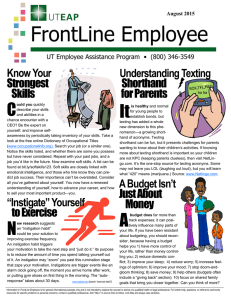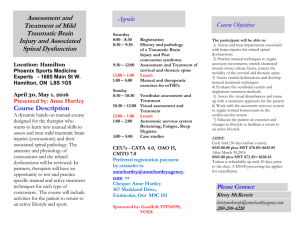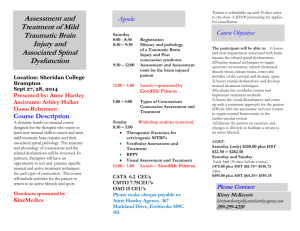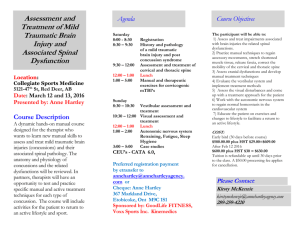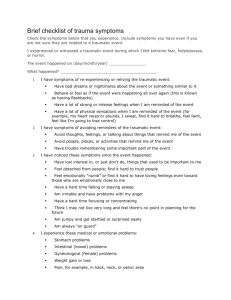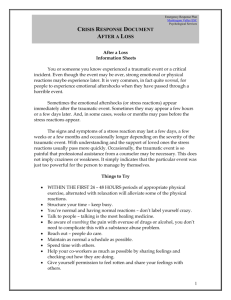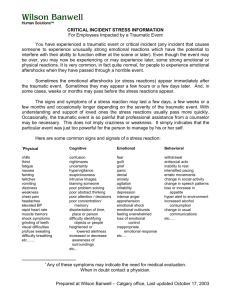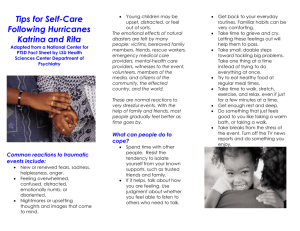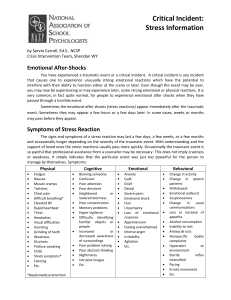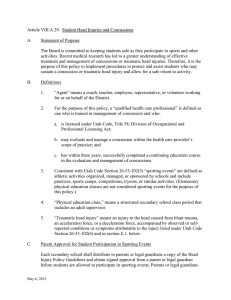August 2015
advertisement
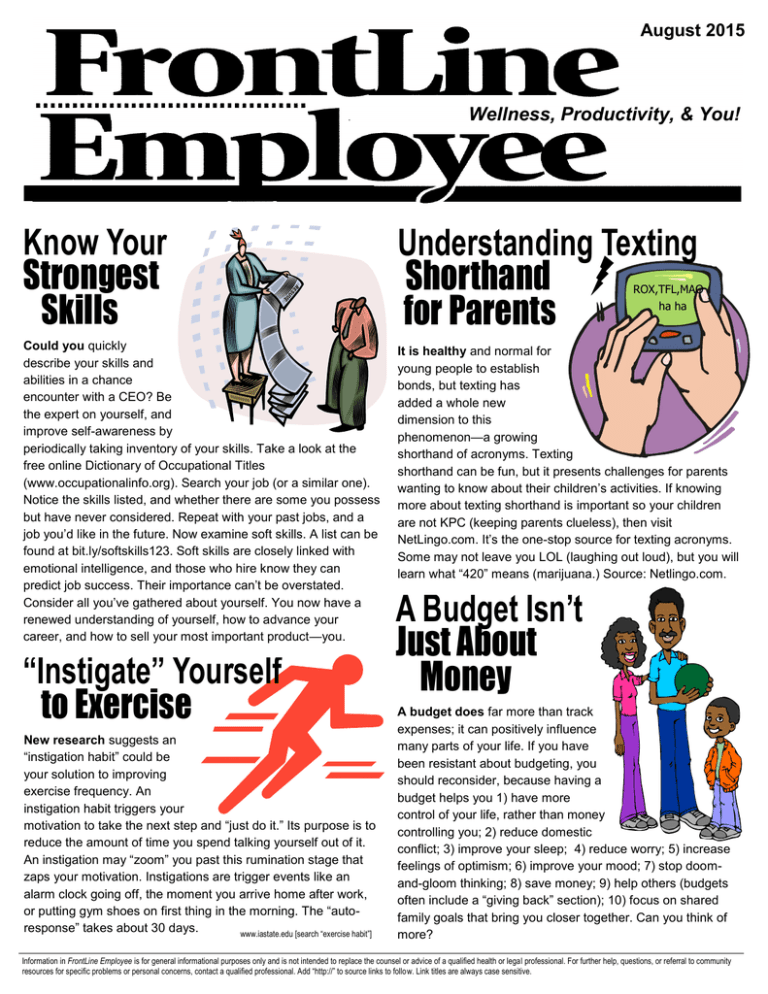
August August 2015 2015 Wellness, Productivity, & You! Know Your Strongest Skills Understanding Texting Shorthand for Parents Could you quickly describe your skills and abilities in a chance encounter with a CEO? Be the expert on yourself, and improve self-awareness by periodically taking inventory of your skills. Take a look at the free online Dictionary of Occupational Titles (www.occupationalinfo.org). Search your job (or a similar one). Notice the skills listed, and whether there are some you possess but have never considered. Repeat with your past jobs, and a job you’d like in the future. Now examine soft skills. A list can be found at bit.ly/softskills123. Soft skills are closely linked with emotional intelligence, and those who hire know they can predict job success. Their importance can’t be overstated. Consider all you’ve gathered about yourself. You now have a renewed understanding of yourself, how to advance your career, and how to sell your most important product—you. It is healthy and normal for young people to establish bonds, but texting has added a whole new dimension to this phenomenon—a growing shorthand of acronyms. Texting shorthand can be fun, but it presents challenges for parents wanting to know about their children’s activities. If knowing more about texting shorthand is important so your children are not KPC (keeping parents clueless), then visit NetLingo.com. It’s the one-stop source for texting acronyms. Some may not leave you LOL (laughing out loud), but you will learn what “420” means (marijuana.) Source: Netlingo.com. ROX,TFL,MAO ha ha A Budget Isn’t Just About Money “Instigate” Yourself to Exercise A budget does far more than track expenses; it can positively influence many parts of your life. If you have been resistant about budgeting, you should reconsider, because having a budget helps you 1) have more control of your life, rather than money controlling you; 2) reduce domestic conflict; 3) improve your sleep; 4) reduce worry; 5) increase feelings of optimism; 6) improve your mood; 7) stop doomand-gloom thinking; 8) save money; 9) help others (budgets often include a “giving back” section); 10) focus on shared family goals that bring you closer together. Can you think of more? New research suggests an “instigation habit” could be your solution to improving exercise frequency. An instigation habit triggers your motivation to take the next step and “just do it.” Its purpose is to reduce the amount of time you spend talking yourself out of it. An instigation may “zoom” you past this rumination stage that zaps your motivation. Instigations are trigger events like an alarm clock going off, the moment you arrive home after work, or putting gym shoes on first thing in the morning. The “autoresponse” takes about 30 days. www.iastate.edu [search “exercise habit”] Information in FrontLine Employee is for general informational purposes only and is not intended to replace the counsel or advice of a qualified health or legal professional. For further help, questions, or referral to community resources for specific problems or personal concerns, contact a qualified professional. Add “http://” to source links to follow. Link titles are always case sensitive. . August 2015 Frontline Employee Treating the Aftermath of Trauma More Worker Diligence: Reducing Errors All of us handle stress differently, including traumatic stress— experienced when a severe injury or the threat of severe injury or death occurs, or while witnessing these things affecting others. Believability of the threat and fear are key factors that produce traumatic stress. How you react to traumatic stress does not demonstrate weakness or other personality flaws. However, lingering symptoms may cause you to think, “I should snap out of this.” Caution: Overcoming traumatic stress is not necessarily a do-it-yourself project. This avenue of thought could lead you to avoid the best form of help— counseling with a professional who could help you return to a pretrauma state. If you experience sleep disturbances, intrusive thoughts, mood swings, flashbacks, or are easily startled following a traumatic event, talk to a professional counselor, your doctor, or employee assistance professional. Like a cut or other physical injury, traumatic stress left untreated or ignored can fester too. Not with bacteria, of course, but with bothersome symptoms that may cause additional issues if they remain chronic. Proper treatment approaches exist to help you overcome traumatic stress and prevent it from interfering with your life. Am I Under Too Much Stress? Could you be under too much stress and not realize it? Being overstressed (in distress) doesn’t necessarily include worry, dread, anxiety, or sleep problems. Though common, these symptoms are not experienced by everyone. Instead, you might experience rashes or diarrhea, bicker more with a life partner, have neck pain, or become disorganized and forgetful. Being quick to anger (“snappiness”) is a sign of increasing distress, but self-awareness for spotting it may be minimal. Others are more likely to point it out. Reaction to stress stems from the body’s “fight or flight” response to a perceived threat. This response can manifest in different ways, but because life stress is often psychological (fear of being fired, late to work, etc.), there is nowhere to run. Stress therefore will take its toll on your body. When undesirable symptoms of stress appear and don’t relent, it’s time to intervene. Find a large list of stress symptoms at www.stress.org/stress-effects. . Always seeking perfection will exhaust you, but eliminating more errors is possible with a few tips. 1) Do creative work during the day when you are more alert. 2) Step away from your work for at least 15-20 minutes before checking it for mistakes. Not doing so will cause you to overlook even obvious errors. 3) Your reputation at work is built via three primary channels: quality work, responsiveness to others, and ability to engage productively with those around you. Knowing this can motivate you to pursue more error-free work. 4) Understand the “doctrine of completed staff work.” A Google search will reveal how heartily this principle is valued by management. Completed staff work means doing things so thoroughly that an answer to nearly every possible question accompanies the final product. Understand and apply this principle whenever possible and you’ll amaze others with your competence and ability to deliver. Prevent Sports-related Concussions August is back-to-sports practice month. These few pass-along tips can help reduce risk of sports-related concussions: 1) Wear protective equipment in practices. 2) Never assume a helmet makes you invincible against head injury (especially if used like a battering ram). 3) A helmet protects against external injury, but remember, the brain floats in a fluid. It can be bruised or injured with strong impact. 4) Having no symptoms following a blow to the head does not mean a concussion won’t appear 2-3 days later. If in doubt, sit out. 5) Always seek medical care following a blow to the head, and follow a doctor’s instructions even if you feel fine. 6) Never risk a second concussion by dismissing symptoms you think are minimal following a head blow. Find concussion checklists at cdc.gov. Source: CDC.gov [search: “concussion checklist”]
